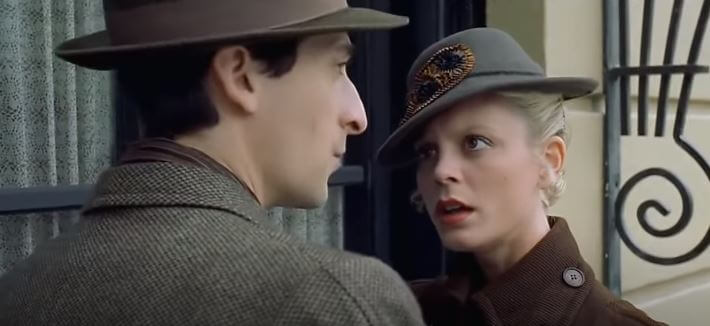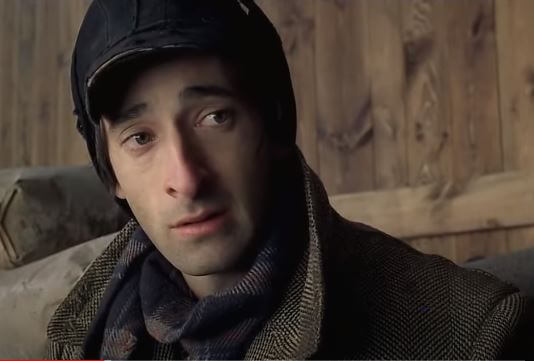The Pianist is a biographical war drama film of a Polish-Jewish Pianist, Wladyslaw Szpilman, directed by the much-acclaimed director, Roman Polanski. It is about Szpilman’s extraordinary survival during the Holocaust.
The film covers the one-man survival through the Nazi invasion of Poland and the perils he has to face just to stay alive losing everything he held dear to his life including his family, his love, his occupation, status, and his passion, the Piano. It brings forward the miseries faced by one race in the hands of another, treated like worms, tortured to death. To this day one fails to understand what made one race morbid with such arrogant power to try to abolish and exterminate another from the planet. This film is the moving tale of one of the darkest times in world history as seen through the eyes of one Jew.

The Pianist Movie Storyline
Szpilman, a noted pianist, lives with his family in Warsaw, the capital city of Poland. He is very prominent in Poland and Berlin and used to play for the Polish radio in Warsaw. When the Nazis invaded Warsaw, they stripped away the livelihood of all the Jews. First, the bank accounts of Jews were curbed and any deposits over 2,000 Zlotys were blocked. Next came an order that all Jews should wear an armband bearing the blue Star of David. Later, they were forbidden from public transit, public restaurants, and parks. Then an order was issued to move them to a Ghetto which covered an area of 3.7 square kilometers and housed around 400,000 Jews.
Szpilman’s family, one of the respected and well-settled Jewish families in Warsaw, is forced to first live with meager income and later relocate to a ghetto. The ghetto had around 9 Jews living per quarter and was alienated from the rest of the city with a huge brick wall.
The ghetto was overcrowded, had meager sanitation and most of the Jews there were unemployed and unkempt. Szpilman finds a job to play in a local café and manages to support his family, until one day, orders come to relocate the Jews to the Treblinka extermination camp, one of the deadliest camps built by the Germans to kill the Jews in masses through gas chambers.
Check out the best of World Cinema Here
As they are heading to the station, one of the Polish police recognizes Szpilman and pulls him out of the line. The rest of Szpilman’s family members are deported to the camp to die. Szpilman somehow manages to find work in the ghetto and aids the Poles and Jews to collect weapons for the Jewish uprising against the Germans. With the help of his musician contacts, he manages to escape the ghetto and goes into hiding.
He is moved from one place to another frequently, he hides in the cupboards and the attics. He hides in small empty apartments at times with his Polish friends locking him in and getting him food once or twice a week. Every time the Germans find a hideout, he runs to a different one. In one of the hideouts, a greedy corrupt Pole abandons him and he has to survive without food for more than two weeks. He develops jaundice and liver infections and miraculously escapes death.
Thus, the time flies by, Allies start bombing Berlin, internal uprisings surge, and the Germans are surrounded. But still, Jews are treated like flies, killed at sight. When he is hiding in one of the attics, Szpilman is found by a kind German officer who is sick of Nazi policies. He gives him a better hideout and brings him food and clothes. He assists him till the German retreat and Poland is finally free from the clutches of Germany.
After the war, Szpilman is back on the Polish radio and goes on to launch a very successful musical career of his own. He tries to rescue the German officer Hosenfield who helped him but is unable to do so and Hosenfield dies in the soviet prisoner’s camp in 1952.
My Opinion On The Film
The movie is brilliantly taken and leaves no stone unturned to showcase the brutality faced by the Jews in the hands of Germans. As an audience, we flinch when the Germans celebrate the mass shooting of the Jews or when they make them dance to mock them. There are heart-wrenching scenes when a mother smothers her own baby and when a Jew licks the porridge which fell on the road to quench his hunger.
The Pianist Movie: Acton, Screenplay, and Direction
Adrien Brody is brilliant as Szpilman. His metamorphosis from a successful Pianist to a starving scared Jew is exceptional. He portrays the timid yet strong character of Szpilman with deep conviction. Szpilman is never brave, but he wanted to survive, he wanted to have his own personal victory over the Germans.

Roman Polanski’s direction is brilliant. The sets are elaborate, every minute detail is captured in the most hideous of the places. The life in the ghetto, those overcrowded roads, the crowded cafes, and the destroyed attics makes the audience writhe in pain. Tears are unstoppable when we from our seats howl in agony at the plight of those Jews who were tortured brutally by the heartless Germans.
The Pianist is a brilliant movie, and it will linger in our minds forever. No doubt it swept most of the awards that year including the Oscars for the Best Director, Best Adapted Screenplay, and the Best Actor. I rate this movie 10/10.
The World of Movies Rating – 10/10
Movie Title: The Pianist
Directed by: Roman Polanski
Based on: The Pianist by Władysław Szpilman
Written by: Ronald Harwood
Main Cast: Adrien Brody as Władysław Szpilman, Emilia Fox as Dorota, Maureen Lipman as Edwarda Szpilman, Frank Finlay as Samuel Szpilman, Thomas Kretschmann as Captain Wilm Hosenfeld, Michał Żebrowski as Jurek, Andrew Tiernan as Szalas, Julia Rayner as Regina Szpilman, Ed Stoppard as Henryk Szpilman
Year of Release: 2002
Genre: History, Biography, Drama
Country of Origin: France, Germany, Poland, United Kingdom
Language: English, German
Running Time: 150 Minutes
Production Company: R.P. Productions, Heritage Films, Studio Babelsberg
Distributed by: Focus Features
Image Source: Screenshots taken from the movie.
Reviewed by: Anantha Alagappan
